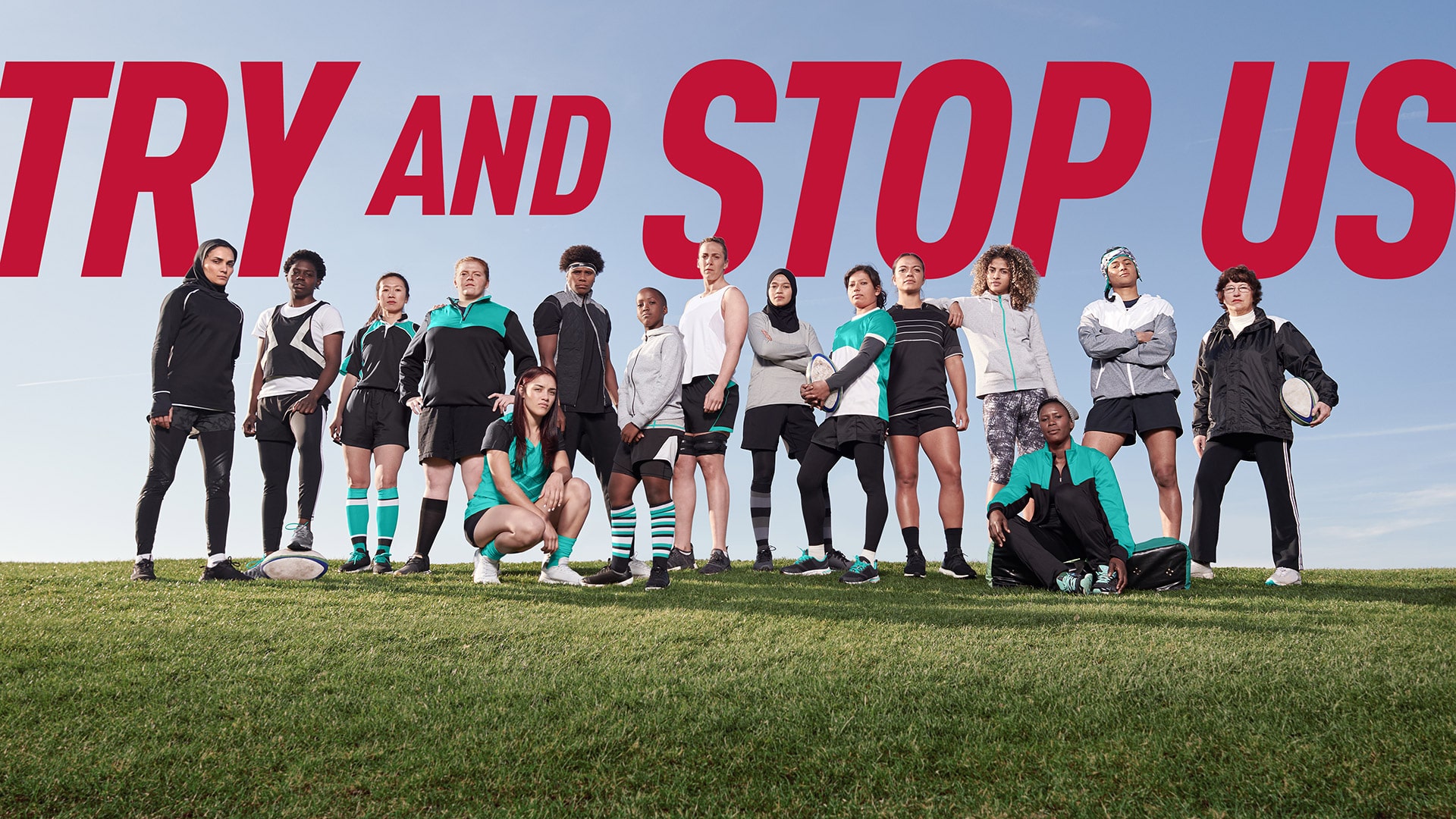Marissa Pace, who joined World Rugby as its chief marketer in January, got into the sport as a teenager in the mid-1990s, and wanted to play for her high school team.
At the time, however, Bishop's College School in Sherbrooke, Quebec, wasn't fielding a girl's squad. So Pace and some friends "decided to join the junior boys team in protest," she recalls. "The school finally relented after they decided that having a co-ed team was probably a bit too risky."
Bishop's became one of the first high schools on Canada's east coast with a girl's ruby team, and others soon followed.
Pace, a Montreal native, later played at Queen's University in Kingston, Ontario. Her love for the rugged, fast-moving, often balletic game informed her career trajectory, as she rose through the global sports marketing ranks, at one point serving as digital media head at Formula One.
Rugby can trace its origins to 1886, and it's immensely popular in some markets, played by nearly 10 million people around the globe. World Rugby—the world governing body for the sport of rugby union, and organizer of the Rugby World Cup every four years—claims more than 500 million views across its online platforms. But Pace plans to boost engagement on a broad scale.
"Our biggest marketing challenge," she says, "is to flatten the stigma that rugby is a male sport played by what most would consider 'rugby nations'—New Zealand, South Africa, England, Scotland, Ireland, Wales, France. 'Next Generation' nations like the U.S., Japan, Georgia, Russia and Germany are getting to finals and semifinals of major tournaments."
The 2019 Rugby World Cup, which kicks off in September, will be played in Japan, providing a big stage to woo new fans worldwide. (The competition features 20 men's teams representing various countries. The Women's Rugby World Cup is slated for 2021 in New Zealand.)
For this year's event, "we're looking at 80 percent of all match tickets sold," Pace says, "with 70 percent of them going to local fans. Equally, we're working with our regional teams and unions in India, China, the U.S. and other nations where the largest fan growth is being generated."
Sure, rugby's rules can confuse neophytes. Sometimes seven players compete on a side, sometimes 15—and the methods of scoring take some getting used to (as in American football, a goal line and goalposts are involved). The game has a low professional profile in North America, but it's worth noting that with the right mix of marketing, money and moxie, secondary sports can quickly become ingrained in the public consciousness. Barely a decade ago, relatively few Americans followed domestic or European soccer. Today, the games equal beaucoup business, generating mega-buck deals from media outlets and advertisers.
In the conversation below, edited for length and clarity, Pace discusses her strategy, talks about the lessons she learned at Formula One, and addresses getting a seat at the table—quite literally—as a female executive in what's largely perceived as a man's game.
Muse: You say rugby is wrongly viewed as a male sport. What have you done to address that?
Marissa Pace: A campaign we launched in May called "Try and Stop Us" highlighted 15 girls and women from around the world who have found strength through playing rugby, and it's shown tremendous new growth in reaching that demographic. In 2018, we had an increase of 28 percent of registered female rugby players. Through the "Try and Stop Us" campaign, we expect that to rise even more.
What other key moves have you made since joining World Rugby?
One major project is the realignment of our content teams, and we'll assume host broadcasting responsibilities for the HSBC Sevens Series from the upcoming 2019 season onwards. By bringing this in-house, we'll control what the viewer sees and how they experience the matches through our various content touch points—online, offline, social and other platforms.
We're also not rushing to build an OTT platform that delivers video content, as so many sports have done. We want to redefine what online sports video consumption can look and feel like. Our content-viewing experiences need to be as exciting as sitting pitch-side, with more interaction and personalization than we've seen in the sports market. Since we're relative latecomers to the space, we can afford the time to write the story for the next wave of sports-viewing technology.
Who is World Rugby's primary audience?
We're targeting an audience that's looking for sports entertainment with authenticity, incredible displays of athleticism, emotion and most importantly, respect. We're a sport that builds character, and we strongly believe that's our USP over other sports. In an age when you see sports controversy, a lack of respect, feigning dives, and so on, we're constantly reminding our audience that we represent something different. We promise to entertain you, but also move you.
If I'm not a follower of the game. How would you target me?
If you're new to rugby, I'd encourage you to catch one of our HSBC Sevens Series games in a stadium, on TV or online. The men and women on the field are exceptional athletes who are so fast, they could be lining up in the 100-meter qualifiers, but they can also powerlift—[and they have] "dream-team" ball-handling skills. A team like the USA will blow you away with their speed, while Fiji will puzzle you and the opponents with their unexpected, one-hand-behind-the back passes. It's seven players and seven minutes a side, so it's a very consumable sport. It's competitive, it's fast, and it's a brilliant display of athleticism.
The way I'd get you interested in 15s [15 players a side] is to explain the intricacies of the teamwork on the field between the forwards and the backs. It's a game of endurance, hard hits, respect and camaraderie. During a single match, you can see some of the most intense "scrums" or "mauls," where two sides push each other from opposite ends, to a referee reminding a 250-pound player to respect rules on the field—and the player listens!
If that doesn't convince you, I'd take you into the stands to mingle with the fans—the soul of the sport. Unlike other events, at a rugby match you can sit, stand or chant with someone from the opposite side and have the time of your life. To market the sport, we'll be harnessing that energy.
Can you talk about a few key stars and how you're leveraging their fame?
Rugby is a team sport like no other. In many of our tournaments, the players don't have their names on the backs of their shirts. It's just their numbers, which represent their position on the field or role on the team. The Players of the Year awards are always tightly contested, with the 2018 recipients Johnny Sexton of Ireland [men's rugby] and Jessy Tremouliere of France [women's rugby]. These awards are voted by fans and peers as well as experts, so they are the ultimate accolade.
Carlin Isles from Team USA in the men's HSBC Sevens Series is certainly worth a mention, given his unbelievable speed at just 1.73 meters tall [5-foot-6], holding the 100-meter record in Sevens. But perhaps, pound-for-pound, the best rugby player on the planet is New Zealand's Portia Woodman, who has won everything there is to win in the game and is an incredible role model and ambassador. One thing you have to remember is that many of the players in Sevens are semi-professional, and it's humbling to hear that some are full-time plumbers or electricians while being absolute heroes on the pitch.
From a marketing side of things, I will certainly work to bring the characters out of each team, but I think I'd be doing a disservice to the spirit of rugby if I neglected to tie it back into the team aspect.
Are you adapting what you put into practice at Formula One?
I was able to relaunch the F1 website and app, which reached more than 100 million unique users with their first-ever B2C digital offering called "F1 Access." We also worked tirelessly to bring F1's first social presence to life in 2013. You'd think it would be reasonably simple, but in an environment where everything had to be OK'ed by an 86-year-old CEO [Bernie Ecclestone], it was a challenge to show him the value.
The work I did at Formula One was a combination of bringing promoters, broadcasters, sponsors and teams together, and I find myself doing the same at World Rugby. Thanks to an incredible team before me, our social platforms perform immaculately, but my role will join up the fan experience and fan engagement through all our touch points.
Are there challenges being a woman in the bro-centric world of pro sports?
This is a funny question that I get asked often, but actually I don't see the divide that others see. As a quick anecdote, I walked into a very formal launch with a male colleague who had equal seniority. I was quickly approached by someone who told me where my colleague could sit and, as we were abroad and language was a barrier, I tried to explain that we needed two seats—one for me, one for him. The conversation didn't go well because I couldn't seem to make the host understand that we needed two seats. My colleague realized what was happening, pulled me aside and pointed out that the person thought I was his assistant—and that I, therefore, wouldn't require a seat.
I know that kind of thing bugs some people, but it doesn't really bother me. With 15 years in advertising and 10 in motorsport, I'm used to being the only female in the room, but I was raised and educated as a strong person, not a strong woman. My philosophy has been that as a leader, you have to stick to data. Numbers win, but emotions are riskier. And if you do that [stick to numbers], and you know your space and your audience, you can combat any challenge. I try not to sweat the small stuff. I have bigger fish to fry.
What your best advice for women starting out?
The advice I would give any aspiring sports-marketing executive, not just young women, would be to avoid career-limiting moves. Everyone is presented with choices along the way, often difficult ones, where you can either go with your gut or go with what you think will get you ahead. My advice would be to go with your gut every time. I followed my passion, and I tried to say no to what I thought could be the easy routes, and I'm glad to say I can hold my head high so many years later. When my dream job was offered to me by Mr. Ecclestone, originally I turned it down because I knew the ramifications it would have on my existing team. When the time came, he was a man of his word and came back to me on the offer. I believe in the good of people, and I definitely believe in taking the high road. Take it at all costs.
You were a Clio Sports judge this year, for the Digital/Mobile and Social Media jury. Which work did you like best?
This year was my second time as a Clio judge, and the entries were stronger than ever. It's an honor to have been part of it. The Nike campaigns are always strong, and I particularly liked "Dream Crazy," but I appreciated it even more within the context of the "Dream Further" campaign released in June for the Women's World Cup [of soccer]. It's underpinned by a strong and important message: "Don't change your dream. Change the world." Words we should all live by.
What are your favorite sports-themed campaigns of all time?
The first kind are the ones that pull you from the pit of your stomach, off your chair and into action. My favorites in recent memory are "This Girl Can" by Sport England and "We're the Superhumans" by Britain's Channel 4 for the Paralympics. They break ground without the big-name sports heroes and offer a rallying cry for people to follow.
The second kind of sports-themed campaign creeps into your life and turns you into a fan. I'd say that's been achieved by the Netflix series "Drive to Survive," though I disagree with the title. For all the bells and whistles that the new F1 regime put into place after Mr. Ecclestone left, this series seems to have done more for the sport than any marketing in recent memory. A new way to get sport into people's hearts and especially to the top of the newsfeed on their mobile devices.












